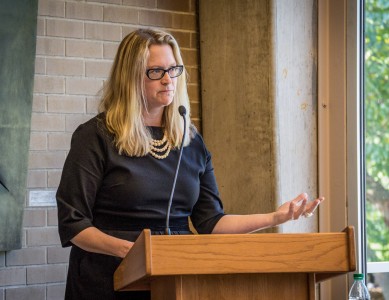On Thursday, Oct. 9, Professor Astrid Henry, Gender, Women’s and Sexuality Studies (GWSS), read an excerpt from her recently published book “Feminism Unfinished: A Short, Surprising History of American Women’s Movements” and talked about her process writing the book with co-authors Dorothy Sue Cobble and Linda Gordon. Around 40 people attended the reading in Burling Library, including Henry’s father and students and faculty representing many different departments.
Henry began by mentioning the challenge in writing the book in a very limited amount of time, which added to the difficulty of the project.
“This is the fastest publication I’ve ever produced. From the first phone call inviting me to write the book with Linda to the day it came out was just over two years, which is very [fast] for a publication to get into print,” Henry wrote in an email to The S&B.

Photo by Jun Taek Lee.
In her talk, Henry discussed the book as a whole, but focused on the chapter that she contributed to more heavily. She, Cobble and Gordon wrote the introduction and epilogue together.
The book explores the history of feminism in America but distinctly tries to break away from the usual ‘waves’ metaphor that typically accompanies feminist movements. The book also approaches feminism through an intersectional lens, looking at the way that many oppressions and privileges intersect, which entails exploring things such as race, class and sexuality together with gender as opposed to solely a gendered viewpoint.
“Our motivation generally was to write a
book that challenged the idea that feminism was over and that its heyday had ended in the 1970s,” Henry wrote. “We also wanted to show how feminism has a long history of being an intersectional movement, one in which gender justice is contacted to racial justice, sexual freedom and an end to class oppression. So throughout the book we focus on elements of the women’s movement over the last 100 years—and specific figures within the movement—who demonstrate this broader, more inclusive vision of feminist: beyond just a movement for white, middle class straight women.”
Henry’s chapter focused on the early 80s to early 90s period in feminist history. She looks at how Anita Hill and Rebecca Walker sparked what has been called the “Third Wave” of feminism. She detailed how print forms and online forums added to and changed the ways that feminists were involved with and pushed the movement forward.
“Linda Gordon … contacted me after reading my first book, “Not My Mother’s Sister: Generational Conflict and Third-Wave Feminism.” She said she wanted to write a relatively short introduction to the history of U.S. women’s movement and wanted to know if I would write the section on the contemporary period. As a long-time fan of her work, I was thrilled to get the invitation,” Henry wrote. “I think my least favorite part was trying to figure out how to end my section, which ends now, basically. It’s always difficult when writing about the present period to determine where one should end and what one should include as historical events.”
The authors also hoped to make the book accessible to as many people as possible by moving away from exclusive academic vocabulary, and including many references to outside academia and into a more relatable vernacular.
“The book is deliberately written for a general reader who may know little to nothing about the U.S. women’s movement or the history of feminism,” Henry wrote. “In that way, we hope it will be used in Intro to GWSS and History of U.S. Women type courses, but we also want it to reach a broader audience outside of institutions of higher education.”
During the reading, Grinnell students and faculty listened attentively and thoroughly examined different parts of her topic of interest and research.
“I appreciated how Professor Henry critiqued the wave metaphor usually used to discuss the history of feminism. But I was a little disappointed that her talk didn’t seem to move beyond issues of political representation,” said attendee Linnea Hurst ’15.
Henry spoke enthusiastically about her body of work, and she stated that she hoped students outside of the GWSS major would pick up the book. Henry mentioned that she enjoyed the collaborative aspect of writing the book and was excited to see it reach a broader audience.
“I think my favorite part of working on it was the collaborative process of sharing my writing with my two co-authors. Academic writing is usually a pretty lonely, solitary act, so it was great to work with these two feminist historians on this project and share our ideas as we were writing,” Henry wrote.
























































